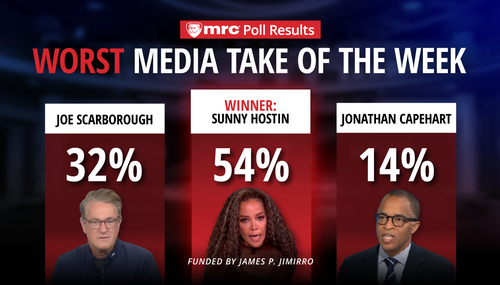Reasonable people agree that Americans fear of Islamic terrorism is irrational. Unfortunately, President Obama can't say that in public. That’s the thrust of New York Times reporter Peter Baker's “news analysis” on Tuesday’s front page, the morning before Obama’s last State of the Union Address: “A Speech to Balance Terror and Reality.” Baker followed up on Wedensday’s front-page with a SOTU post-mortem analysis that buried mentions of Islamic State, just as the president did in his speech last night.
Baker’s pre-game analysis Tuesday dovetailed with the administration’s condescending attitude toward the terror fears of their fellow Americans.
When President Obama speaks to the nation in his final State of the Union address on Tuesday night, he will offer a familiar reassurance that the country is expending enormous effort to protect Americans against international terrorism.
Here is what he probably will not say, at least not this bluntly: Americans are more likely to die in a car crash, drown in a bathtub or be struck by lightning than be killed by a terrorist. The news media is complicit in inflating the sense of danger. The Islamic State does not pose an existential threat to the United States.
The administration might not be pleased to see its defeatist attitude spelled out on the front of the New York Times:
He will presumably not say this, either: Given how hard it is for intelligence and law enforcement agencies to detect people who have become radicalized, like those who opened fire at a holiday party in San Bernardino, Calif., a certain number of relatively low-level terrorist attacks may be inevitable, and Americans may have to learn to adapt the way Israel has.
By all accounts, Mr. Obama is sympathetic to this view, which is shared by a number of counterterrorism veterans who contend that anxiety has warped the American public’s perspective. But it is also a politically untenable argument at a time when polls show greater fears about terrorism than at any point since the weeks after Sept. 11, 2001. As it is, critics contend that Mr. Obama does not take the threat seriously enough and has not done enough to guard the nation against attack.
“Do we overemphasize terror? Yes,” said Juliette Kayyem, who served as an assistant Homeland Security secretary under Mr. Obama. “But there’s not much government can do about that. It’s a different kind of violence. It’s meant to elicit fear. So the fact that it does elicit fear is hard to refute.”
It’s all in our heads, apparently, and since it doesn’t threaten the country “in a fundamental way” it’s nothing to panic about. Isn’t the administration setting the bar for threats rather low?)
The effect on the public psyche is inherently more powerful than other dangers Americans accept every day. “Comparing it to shark attacks is apples and oranges,” she said, “and that’s the challenge for anyone trying to communicate risk.”
That dynamic frustrates Mr. Obama as he struggles to explain his approach to the threat. In a recent off-the-record meeting with columnists, he emphasized that the Islamic State, also known as ISIS or ISIL, did not threaten the United States in a fundamental way, according to people who were in the room.
Baker acknowledged that the public isn’t buying Obama’s cool, almost blasé attitude:
The president is more careful about expressing such an analysis in public, acutely aware that his past comments have made him look as if he was underestimating the threat. When Mr. Obama at first called emerging groups like the Islamic State the “J.V. team” of terrorism, he looked as though he did not grasp its lethal reach after it seized parts of Iraq and Syria. When he more recently said the group had been “contained,” he looked as if he was out of touch, given the attacks in Paris and San Bernardino that followed.
Interestingly, Baker finally worked into print a damning detail that it had been controversially dropped from a story he cowrote last month (based on an off-the-record meeting the president held with liberal columnists) on Obama’s tepid response to the terrorist attacks: That he failed to recognize Americans’ fear because he doesn’t watch much cable TV:
Mr. Obama acknowledged to the columnists that he was slow to respond to public fears after the Paris and San Bernardino attacks. He said he might not have fully recognized the anxiety because he was overseas at first and in general does not watch much cable television -- as much a jab at the news media as an admission on his part.
Baker repackaged Obama's defeatist attitude as a "nuanced argument."
He later tried to modify his public response with tougher language and more events to demonstrate resolve. He has tried to make a nuanced argument, but it has drawn scorn on the campaign trail among Republicans who portray him as woefully weak. While Republicans vowed to destroy the enemy, Mr. Obama argued against overreaction, as with Donald J. Trump’s proposal to temporarily bar the entry of foreign Muslims.
....
Never mind that only a relative handful of people have been killed in terrorist attacks in the United States since Sept. 11. The annual risk of dying in a terrorist attack in the United States between 1970 and 2007 was one in 3.5 million, according to data presented by John Mueller, a senior fellow at the Cato Institute who has written extensively on what he considers the exaggeration of the terrorist threat.




